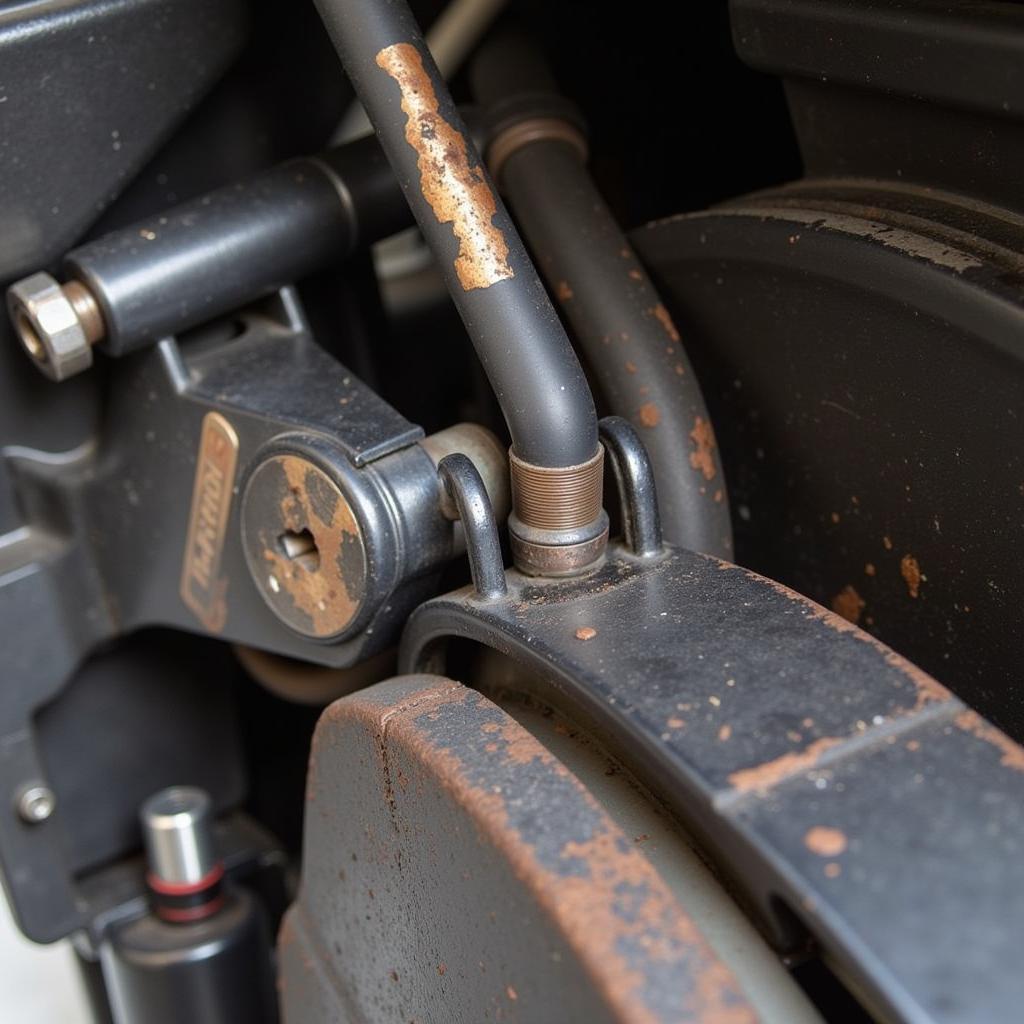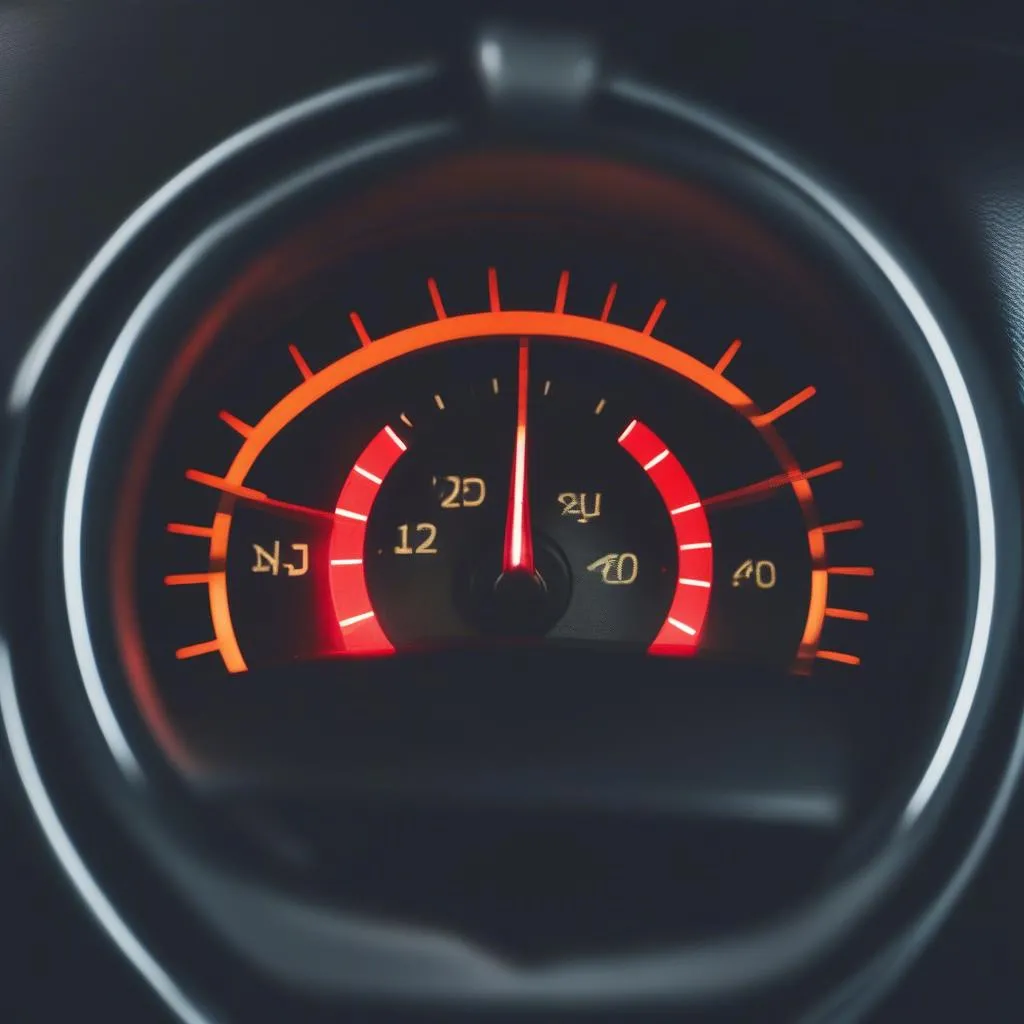The brake fluid warning light on your Audi A3 dashboard is a crucial safety indicator. When illuminated, it signals a potential problem within your vehicle’s braking system that requires immediate attention. Ignoring this warning could lead to reduced braking performance and increase the risk of an accident. This comprehensive guide explores the common causes of the Audi A3 brake fluid warning light and provides actionable steps for diagnosis and repair.
Understanding Your Audi A3 Brake Fluid Warning Light
Your Audi A3 relies on hydraulic pressure to engage the brakes and bring the vehicle to a stop. This pressure is generated by the brake fluid, a specialized fluid with a high boiling point designed to withstand the heat generated during braking. The brake fluid warning light is directly connected to your brake fluid reservoir, a small container typically located near the master cylinder in the engine bay.
When the brake fluid level drops below a certain threshold, the sensor in the reservoir triggers the warning light on your dashboard. This drop in fluid level can indicate several potential issues, ranging from normal brake pad wear to more serious leaks within the braking system.
Common Causes of an Illuminated Brake Fluid Warning Light
1. Worn Brake Pads
One of the most common reasons for the brake fluid warning light to illuminate is worn brake pads. As your brake pads wear down with use, the brake calipers need to extend further to maintain contact with the rotors. This extension requires more brake fluid, causing the level in the reservoir to drop. If you notice the warning light after a period of regular driving and haven’t experienced any other braking issues, worn brake pads are the likely culprit.
2. Brake Fluid Leak
A leak in your brake system is a serious issue that requires immediate attention. Brake fluid is corrosive and can damage paintwork if left unattended. Inspect your vehicle for any signs of a leak, such as:
- Puddles of fluid: Look for puddles of clear or yellowish fluid under your car, particularly near the wheels or under the engine bay.
- Wet spots on the brake components: Examine the brake lines, calipers, and hoses for any signs of wetness or fluid residue.
- A soft or spongy brake pedal: A leak in the brake system can cause a loss of pressure, leading to a soft or spongy brake pedal feel.
 Brake Fluid Leak on an Audi A3
Brake Fluid Leak on an Audi A3
If you suspect a brake fluid leak, it’s crucial to avoid driving your Audi A3 and immediately seek professional assistance. Driving with a brake fluid leak compromises your safety and could lead to complete brake failure.
3. Faulty Brake Fluid Level Sensor
While less common, a malfunctioning brake fluid level sensor can also trigger the warning light. The sensor may provide a false reading due to electrical issues or become damaged over time. If you’ve ruled out worn brake pads and a brake fluid leak, a faulty sensor could be the underlying cause.
Diagnosing the Brake Fluid Warning Light on Your Audi A3
Accurately diagnosing the root cause of the brake fluid warning light is essential for effective repair. Here’s a step-by-step guide to help you pinpoint the problem:
- Check the Brake Fluid Level: Park your Audi A3 on a level surface and engage the parking brake. Open the hood and locate the brake fluid reservoir. Most reservoirs have a “Min” and “Max” marking on the side. Check the fluid level and note its position. If the fluid level is below the “Min” mark, it needs to be topped up. However, simply adding fluid without addressing the underlying cause is not a solution.
- Inspect for Leaks: Carefully examine the area around the master cylinder, brake lines, hoses, and calipers for any signs of leaks as described above.
- Check the Brake Pads: If the brake fluid level is low and you don’t find any leaks, it’s likely due to worn brake pads. Refer to your Audi A3 owner’s manual for the recommended brake pad thickness and inspection procedure.
- Consult a Professional: If you are uncomfortable performing these checks yourself or suspect a more complex issue like a faulty sensor or internal leak, it’s best to consult a qualified mechanic specializing in Audi vehicles.
What to Do When Your Audi A3 Brake Fluid Warning Light Comes On
The brake fluid warning light should never be ignored. Here’s what to do when it illuminates:
- Pull over safely: If you’re driving and the warning light comes on, find a safe place to pull over as soon as possible.
- Check the brake fluid level: As outlined above, carefully inspect the brake fluid level in the reservoir.
- Top up the brake fluid (if necessary): Only if you feel comfortable and confident in doing so, and if you have the correct brake fluid for your Audi A3 model, carefully top up the fluid level to the “Max” mark.
- Drive cautiously to a mechanic: Even if you’ve topped up the brake fluid, it’s crucial to drive cautiously to a qualified mechanic to diagnose and address the underlying issue. Avoid heavy braking or high speeds.
Preventing Future Brake Fluid Warning Lights
Taking preventative measures can help avoid future brake fluid warning light occurrences and keep your Audi A3’s braking system in optimal condition:
- Regular Brake Inspections: Adhere to your Audi A3’s recommended maintenance schedule for brake inspections. A qualified mechanic will inspect your brake pads, rotors, calipers, and brake fluid levels, ensuring everything is in good working order.
- Timely Brake Pad Replacements: Don’t wait for the brake fluid warning light to illuminate before replacing worn brake pads. Timely replacement not only prevents potential brake fluid issues but also ensures optimal braking performance and safety.
- Be Mindful of Driving Habits: Aggressive driving with frequent hard braking can accelerate brake pad wear. Practicing smooth and anticipatory driving can help prolong the life of your brake pads.
Audi A3 Brake Fluid Warning Light FAQs
1. Can I drive my Audi A3 with the brake fluid warning light on?
It is not recommended to drive your Audi A3 with the brake fluid warning light on. Doing so could lead to reduced braking performance and increase the risk of an accident.
2. How much does it cost to fix a brake fluid leak in an Audi A3?
The cost of repair depends on the location and severity of the leak. A minor leak in a brake line may be relatively inexpensive to fix, while a leak in the master cylinder or ABS unit could be more costly.
3. What type of brake fluid does my Audi A3 use?
Refer to your owner’s manual or consult with your Audi dealership to determine the correct brake fluid type for your specific model year. Using the wrong type of brake fluid can damage your braking system.
4. How often should I change my Audi A3’s brake fluid?
It’s generally recommended to have your Audi A3’s brake fluid flushed and replaced every 2 years or 24,000 miles, whichever comes first. Brake fluid can absorb moisture over time, reducing its effectiveness and potentially causing corrosion within the braking system.
5. Can I check and top up the brake fluid myself?
Yes, if you feel comfortable doing so and have the correct brake fluid, you can check and top up the brake fluid level in your Audi A3. However, always exercise caution when handling brake fluid, as it is corrosive and can damage paintwork.
Addressing the Audi A3 Brake Fluid Warning Light: Prioritizing Safety
The brake fluid warning light in your Audi A3 is a critical safety indicator that should never be ignored. By understanding its causes, knowing how to diagnose the problem, and taking proactive steps to address it, you can ensure the optimal performance of your vehicle’s braking system and prioritize your safety on the road. Remember, if you are ever unsure about any aspect of your Audi A3’s braking system or encounter the brake fluid warning light, it’s always best to err on the side of caution and consult a qualified mechanic for professional assistance.

